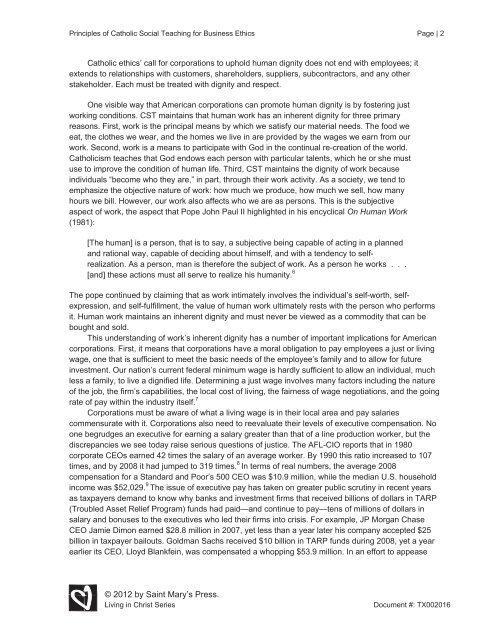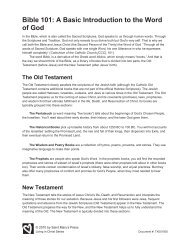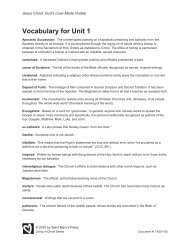Principles of Catholic Social Teaching for Business Ethics Human ...
Principles of Catholic Social Teaching for Business Ethics Human ...
Principles of Catholic Social Teaching for Business Ethics Human ...
You also want an ePaper? Increase the reach of your titles
YUMPU automatically turns print PDFs into web optimized ePapers that Google loves.
<strong>Principles</strong> <strong>of</strong> <strong>Catholic</strong> <strong>Social</strong> <strong>Teaching</strong> <strong>for</strong> <strong>Business</strong> <strong>Ethics</strong> Page | 2<strong>Catholic</strong> ethics’ call <strong>for</strong> corporations to uphold human dignity does not end with employees; itextends to relationships with customers, shareholders, suppliers, subcontractors, and any otherstakeholder. Each must be treated with dignity and respect.One visible way that American corporations can promote human dignity is by fostering justworking conditions. CST maintains that human work has an inherent dignity <strong>for</strong> three primaryreasons. First, work is the principal means by which we satisfy our material needs. The food weeat, the clothes we wear, and the homes we live in are provided by the wages we earn from ourwork. Second, work is a means to participate with God in the continual re-creation <strong>of</strong> the world.<strong>Catholic</strong>ism teaches that God endows each person with particular talents, which he or she mustuse to improve the condition <strong>of</strong> human life. Third, CST maintains the dignity <strong>of</strong> work becauseindividuals “become who they are,” in part, through their work activity. As a society, we tend toemphasize the objective nature <strong>of</strong> work: how much we produce, how much we sell, how manyhours we bill. However, our work also affects who we are as persons. This is the subjectiveaspect <strong>of</strong> work, the aspect that Pope John Paul II highlighted in his encyclical On <strong>Human</strong> Work(1981):[The human] is a person, that is to say, a subjective being capable <strong>of</strong> acting in a plannedand rational way, capable <strong>of</strong> deciding about himself, and with a tendency to selfrealization.As a person, man is there<strong>for</strong>e the subject <strong>of</strong> work. As a person he works . . .[and] these actions must all serve to realize his humanity. 6The pope continued by claiming that as work intimately involves the individual’s self-worth, selfexpression,and self-fulfillment, the value <strong>of</strong> human work ultimately rests with the person who per<strong>for</strong>msit. <strong>Human</strong> work maintains an inherent dignity and must never be viewed as a commodity that can bebought and sold.This understanding <strong>of</strong> work’s inherent dignity has a number <strong>of</strong> important implications <strong>for</strong> Americancorporations. First, it means that corporations have a moral obligation to pay employees a just or livingwage, one that is sufficient to meet the basic needs <strong>of</strong> the employee’s family and to allow <strong>for</strong> futureinvestment. Our nation’s current federal minimum wage is hardly sufficient to allow an individual, muchless a family, to live a dignified life. Determining a just wage involves many factors including the nature<strong>of</strong> the job, the firm’s capabilities, the local cost <strong>of</strong> living, the fairness <strong>of</strong> wage negotiations, and the goingrate <strong>of</strong> pay within the industry itself. 7Corporations must be aware <strong>of</strong> what a living wage is in their local area and pay salariescommensurate with it. Corporations also need to reevaluate their levels <strong>of</strong> executive compensation. Noone begrudges an executive <strong>for</strong> earning a salary greater than that <strong>of</strong> a line production worker, but thediscrepancies we see today raise serious questions <strong>of</strong> justice. The AFL-CIO reports that in 1980corporate CEOs earned 42 times the salary <strong>of</strong> an average worker. By 1990 this ratio increased to 107times, and by 2008 it had jumped to 319 times. 8 In terms <strong>of</strong> real numbers, the average 2008compensation <strong>for</strong> a Standard and Poor’s 500 CEO was $10.9 million, while the median U.S. householdincome was $52,029. 9 The issue <strong>of</strong> executive pay has taken on greater public scrutiny in recent yearsas taxpayers demand to know why banks and investment firms that received billions <strong>of</strong> dollars in TARP(Troubled Asset Relief Program) funds had paid—and continue to pay—tens <strong>of</strong> millions <strong>of</strong> dollars insalary and bonuses to the executives who led their firms into crisis. For example, JP Morgan ChaseCEO Jamie Dimon earned $28.8 million in 2007, yet less than a year later his company accepted $25billion in taxpayer bailouts. Goldman Sachs received $10 billion in TARP funds during 2008, yet a yearearlier its CEO, Lloyd Blankfein, was compensated a whopping $53.9 million. In an ef<strong>for</strong>t to appease© 2012 by Saint Mary’s Press.Living in Christ SeriesDocument #: TX002016
















